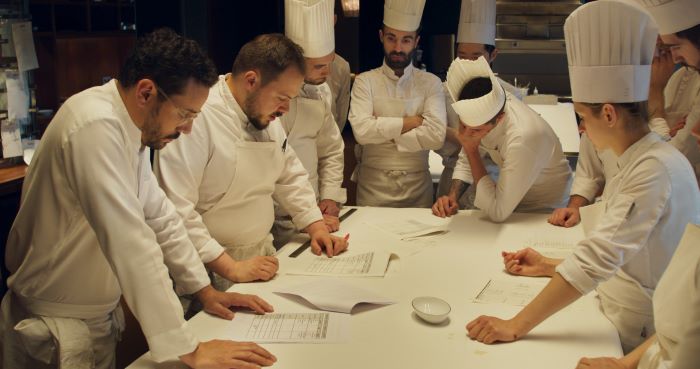Excellence and precision are on display in 93-year-old Frederick Wiseman’s captivating documentary set at a three-star Michelin restaurant in central France. Both the culinary work at the establishments founded by the Troisgros dynasty, and the proficient filmmaking that explores it, are on point. It’s (ahem) a full meal of a film, impressive and gratifying.
Of a piece with explorations in other creative fields—La Comédie-Française ou L’Amour Joué and La Danse: The Paris Opera Ballet—Wiseman again examines the inner workings of institutions, over a career that began in 1967 with Titicut Follies, which focused on a hospital for the criminally insane.
After serving a traditional French menu for years, the Troisgros restauranteurs made a revolutionary shift when they presented a simple salmon dish that helped launch “la nouvelle cuisine” in the 1960s that would go on to upstage the classic Escoffier style of food. Salmon was flash-cooked in a pan (not cooked through) with a tart sorrel sauce placed beneath (a radical idea). In 1968, their restaurant received three stars and has retained the honor, over the generations, ever since.
In a fly-on-the-wall style, the film surveys a complete scope of work, from early morning shopping at the greenmarket, recipe discussions, and painstaking food preparation: dipping berries into chocolate by their tiny stems, making a trompe l’oeil egg (with shell) out of white chocolate, delicately arranging fish flakes to form a flower, and deploying tweezers on a miniscule amuse-bouche. At other stations, langoustines are wrangled, still alive, and veal brains are set in a pan.
Most of the action takes place at the Le Bois Sans Feuilles, which opened in Ouches in 2017. A startling scene reveals how much the highly accomplished chefs are still tweaking or refining a dish minutes before service. Family elder Michel (whose father and uncle had initiated the salmon technique) says a dish is “never finished.” He quietly presses his will as the man in charge for having the most experience. Should we add pomegranate to the crème caramel or not, he asks, and says this dessert needs to be “alive.” In answering guest questions, he provides a history of the family business. His son César is taking the reins of the Ouches kitchen and will be managing all Troisgros endeavors, while his son Léo runs another one of their restaurants. His wife, Marie-Pierre, is in charge of an accompanying hotel and travels the world seeking flea market décor.
Individual producers are introduced at their organic and specialty farms and vineyards. A goat rancher explains that his furry kids are fed organic cow’s milk so the mother’s milk can be saved to make cheese. Back in the kitchen, restaurant orders are recited nonstop, with food allergies and preferences at virtually every table—one “no fish,” one “no asparagus,” one “no raw protein,” etc. Unsurprisingly, the restaurant guests, gleeful in anticipation of their haute meals, are generally midlifers and seniors. One American group whips out phones to take photos after hearing the details of the curry special on their plates. (We don’t see any European guests taking pictures.)
The cinematography by James Bishop is dazzling. It’s art in motion with breathtaking mise-èn-scene—a line of chefs listening to seafood specials, their toques fairly touching the ceiling, or a group foraging in the trees of the tremendous restaurant garden, with a female chef gaining purchase on the shoulders of a cohort.
Some moments verge on astonishing, evocative of The Bear, the Hulu series about a sandwich joint going upscale, in which a character interns at a fancy (also three-star Michelin) restaurant where he’s tasked with polishing the forks. Given our current obsession with food and behind-the-scenes investigations, Menus-Plaisirs—Les Troisgros is less essential as a lens into the unknown and more of a fascinating delve into the components of an illustrious creative business.
At the recent New York Film Festival, Wiseman’s four-hour documentary was a counterpart to Tran Anh Hung’s sensuous upcoming feature The Taste of Things, starring Juliette Binoche as a 19th-century gourmet chef preparing high-end delicacies in a country kitchen for much of its 145 minutes. Menus-Plaisirs, though, is a panorama for the mind as well as the senses.







Leave A Comment